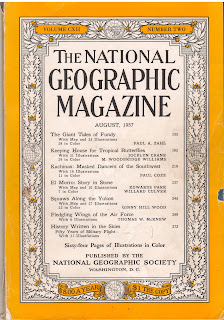Bishop’s 16 September 1957 letter to Grace was written not
long before she and Lota were due to return to Brazil. It was a busy time. Bishop
had just returned from Key West, where she had
gone to see Marjorie Stevens: “I felt I couldn’t leave the U.S.A. without
seeing Marjorie.” With Lota occupied with a Brazilian friend visiting for a few
weeks, Bishop had gone off to reconnect with Majorie after nearly a decade.
Grace knew Marjorie, so Bishop knew Grace would be interested in how she was
doing. Marjorie was also interested to know about Grace. “She asked all about
you,” Bishop wrote.
(Marjorie Stevens and Pauline Hemingway in Key West, 1940s)
Marjorie was living in a “new little house” and was keen to
show it to Bishop. Though it was “fearfully hot in K.W.,” Bishop seemed to have
a pleasant time, and saw several other “old friends.” The big topic was “Blue
Points,” that is, Siamese cats, which Marjorie was taking care of for a friend:
“pale gray with silver markings and blue eyes, beautiful animals.” Being a died-in-the-fur
cat person, Bishop “let them sleep with me,” in spite of the heat. The more
challenging part of their nature was they “talk a great deal!”
Bishop had welcomed this side-trip because Lota (and the
visiting Brazilian friend) was “shopping like crazy,” so the apartment was in a
state of upheaval with all the packages and packing.
Upon returning to New
York, which was “hotter than ever — an unusual heat
wave for September,” Bishop found “a new batch of proof waiting,” which
had to be gone through before they left. You can see what came next: “This,
plus the earlier sailing date, plus the fact that I’m completely BROKE, of
course — means that I don’t see how I can possibly get to N.S.” I suspect Grace
was not surprised, even if she was disappointed. Bishop always “hop[ed] against
hope” to get to Nova Scotia on the rare
occasions she was in the U.S.
in the 1950s and 1960s. But it never happened.
To further explain her financial constraints, Bishop noted,
“I thought I was getting a refund on my income tax that would have paid
for the ticket.” Her accountant, however, had conscientiously applied the
refund “on next year’s instead.” Bishop was never good with business matters.
Perhaps the accountant knew this weakness and was trying to help Bishop, in
spite of herself. After months in the US, Bishop declared, “I’m going off
with lots of unpaid bills and unseen friends.” Still, her “I am so terribly
sorry, really,” sounded genuine. She added, “If it’s any consolation, Aunt F tells
me my Worcester
relatives are mad at not seeing me again!” Poor Aunt Florence “got Lota on the
telephone while I was away — called her “LOLA” and told her how smart I am, but
how it was only natural because the Bishops are all so smart!” When Bishop returned,
she called her elderly paternal aunt, who told her that she wanted “some pink
pajamas, ‘pretty ones dearie’ (as if left to my own devices I’d buy ugly ones).”
There might have been good reasons why Bishop avoided her Worcester relatives.
Amusingly, Florence
declared (in all seriousness) to Bishop that Grace was “getting married.”
Bishop knew, of course, that this was not true, but couldn’t resist: “Is this
true, and if so I wonder who is the lucky man?” Though she knew perfectly well
it was “Aunt F’s fancies.” To extend the joke a bit more, Bishop noted, “I
think it is a fine idea but I’m surprised you’d confide in Aunt Florence
first!” One can see the two of them laughing heartily over this fancy.
Bishop was clearly pressed for time with completing the book
work, shopping, final visits, and other appointments. This letter has a tone
of: there are not enough hours in the day; and a regret of letting go of
something she really wanted to do.
Bishop concluded this letter with an odd story, about an appointment
with the dentist (she had been preoccupied about her teeth in Brazil, needing to get to the dentist; so
getting to one in the US
was a priority). To Grace she said, “I spent the morning at the dentist’s and
read the Sept. [sic: August] National
Geographic — a very silly piece about the Bay of Fundy.”
This piece, “Giant Tides of Fundy,” was written by Paul Zahl. She told her
aunt, “I think I’ll buy it just for the photographs — some of them made me feel
homesick.”
In 1918 Bishop was in another dentist’s office reading a National Georgraphic. Here, nearly 40
years later, she was again registering the contents of one of the most
ubiquitous magazines found in such waiting rooms. One wonders if it might not
have triggered the old memory, though it took nearly another decade before she
began to write “In the Waiting Room.” Zahl’s piece is actually not “silly” but
a passionate and lively account of the environment of the Bay
of Fundy. There are dozens of photographs, and no wonder some of
them made her homesick. She concluded her letter, “I do wish I could get there
now, to see the colours of the maple trees. With much love, and I’ll try to
write sooner.”
The next letter has them back in Brazil.









No comments:
Post a Comment